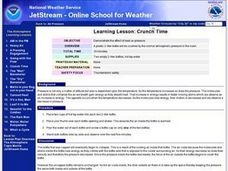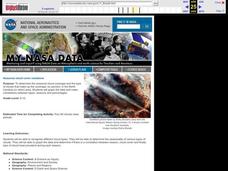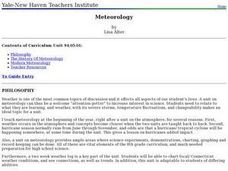Curated OER
Learning Lesson: Crunch Time
Young scholars demonstrate the effect of heat on pressure. They use a 2-liter bottle and hot tap water to complete the experiments. They also discuss thunderstorm safety rules.
Curated OER
Precipitation
Students investigate the formation of rain. They experiment by boiling water in a tea kettle and placing ice cubes and water in a pan. They hold the pan of water over the steaming spout so that the steam strikes the bottom and sides of...
Curated OER
Learning Lesson: Sweatin' to the Coldies
Students participate in a demonstration to show the change of water vapor to a liquid. They discuss the three states of matter. They examine flash flood safety to end the lesson.
Curated OER
Learning Lesson: Measure the Pressure -- The "Wet" Barometer
Young scholars use simple objects to create their own barometer. They have five days to build it and ten days to observe and collect data. They examine thunderstorm safety tips to end the instructional activity.
Curated OER
The Rumblin' Road
Students determine the distance to a lightning strike. They complete a number of examples that determine the distance to a thunderstorm or lightning strike. They focus on safety during a thunderstorm.
Curated OER
Classification of Clouds
Students view a cloud slide show presentation and identify types of clouds. They estimate height based on cloud's appearance. They discuss the vague nature of cloud nomenclature and compare it to the English standard measurement system.
Curated OER
Trends of Snow Cover and Temperature in Alaska
Students compare NASA satellite data observations with student surface measurements of snow cover and temperature. They practice data collection, data correlations, and making scientific predictions.
Curated OER
Classification of Clouds
Students view progressive slides of cloud formations and identify which type of cloud is shown as it forms. They estimate the cloud's height while viewing each image.
Curated OER
Trouble in the Troposphere
Students Use data sets from MY NASA DATA to produce graphs comparing monthly and yearly ozone averages of several U.S. cities. They analyze and evaluate the data and predict trends based on the data. In addition, they discuss and...
Curated OER
Trouble in the Troposphere
Students create graphs using NASA data, compare ozone levels of several U.S. cities, analyze and evaluate the data and predict trends based on the data, and discuss and describe how human activities have modified Earth's air quality.
Curated OER
Does Humidity Affect Cloud Formation?
Learners use NASA's S'COOL database to identify factors that affect cloud formation.
Curated OER
Seasonal Cloud Cover Variations
Young scholars recognize different cloud types. They determine the seaonality of various types of clouds. They graph the data and determine if a correlation exists between season, cloud cover and type of clouds most prevalent during each...
Curated OER
The Water Cycle
Second graders use the program HyperStudio to draw and describe the water cycle. In this science and technology lesson plan, 2nd graders will first become familiar with the water cycle by exploring books and websites in the classroom....
Curated OER
Green House Effect
Young scholars read about the green house effect and how our environment is deteriorating and what we can do to help it. In this green house effect lesson plan, students conduct a home and school energy audit, and create a rap.
Curated OER
Types of Scientists
In this science worksheet, students match each type of scientist listed in the left-had column to its correct description found in the right-hand column. There are 34 different scientists to match on the sheet.
Curated OER
Super Scientist Quiz
In this science worksheet, students match each of the descriptions on the right to the correct scientist listed on the right. There are thirty scientists to identify and match on the sheet.
Curated OER
Meteorology
Students research and produce an oral history that reflects the importance of meterologists in the lives of people in their community.
Curated OER
Defining Drought
High schoolers examine the hydrologic impacts of drought. Humans can change the course of the water cycle, to some extent, to meet their needs, but can they do so without imposing risks on the plants and animals?
Curated OER
Measuring the Number Of Calories In Sunlight
Pupils., in groups, define calorie and compare the absorption of solar energy by three different collectors. They define solar constant and offer several explanations for discrepancies between the data collected and the solar constant.
Curated OER
Tornadoes (Safeside)
Students investigate and demonstrate the science behind the development of tornadoes.
Curated OER
Investigating Leaves Through Printmaking
Students create leaf rubbings as they study the parts of a leaf. They describe the leaves and chart their observations.
Curated OER
Soil Scrolls
Third graders examine soil samples and explore the what happens in each layer of the subsoil. They work in cooperative groups to create a scroll that shows what takes place in each layer, and discuss why much of the activity is in the...
Curated OER
CO2 and Air Pollution
Seventh graders observe and test for the presence of carbon dioxide gas. They compare concentrations of carbon dioxide gas and conclude high concentrations of carbon dioxide gas are unhealthy for human beings.
Curated OER
How Mountains Shape Climate
Students use raw data to make a climatograph; they explain the process of orographic precipitation and the concept of a rain shadow.























